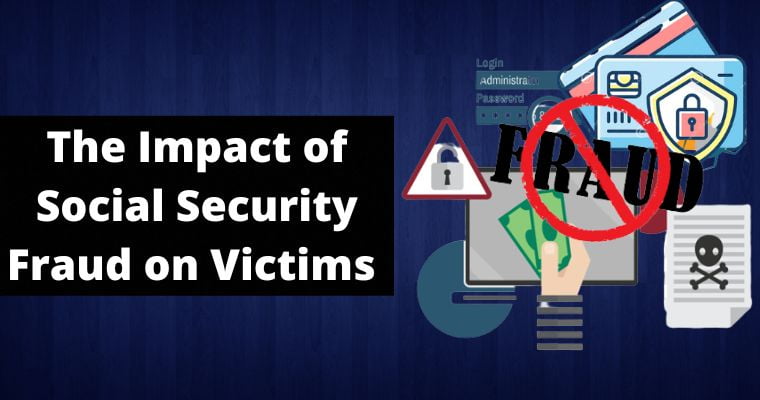Social Security fraud is a growing issue that affects millions of people worldwide. It involves the misuse of Social Security benefits, numbers, and identities by individuals who are not entitled to receive them.
The purpose of this blog post is to shed light on the impact of Social Security fraud on its victims and to raise awareness of the issue.
In this post, we will discuss the different types of fraud, their psychological and financial impact on victims, and steps that can be taken to prevent and report fraud.
Table of Contents
Understanding Social Security Fraud
Social Security fraud is defined as any act of deceit, misrepresentation, or misuse of Social Security benefits or information with the intent to obtain benefits or gain an advantage to which one is not entitled.
This can include identity theft, false claims, or the misuse of benefits by someone who has obtained someone else’s Social Security number or information.
Social Security fraud can be committed through a variety of methods, including online scams, phone scams, mail scams, and in-person scams.
In many cases, fraudsters will use fake websites, emails, or phone numbers to trick victims into providing personal information or sending money. It is important to be aware of these methods and to take steps to protect oneself from becoming a victim of fraud.
Types of Social Security Fraud
Social Security fraud can take many forms, and it is important to understand the different types to help prevent it. The following are the most common types of Social Security fraud:
Identity Theft
This type of fraud occurs when someone uses another person’s Social Security number or information to apply for benefits or obtain employment.
False Claims
This type of fraud involves making false statements or representations to the Social Security Administration in order to obtain benefits to which one is not entitled.
Misuse of Benefits
This type of fraud involves the unauthorized use of Social Security benefits by someone who is not entitled to receive them.
This can include a recipient who continues to receive benefits after they are no longer eligible, or someone who misuses a relative’s benefits. Regularly review your benefit statements and report any discrepancies.
Employment-Related Fraud
This includes working while claiming disability benefits, hiding income from the SSA, or using a false SSN to get a job. Accurately report your employment status and income to avoid issues.
Representative Payee Fraud
A designated representative misuses funds intended for someone else’s care. If you are a beneficiary, choose a trustworthy representative and monitor their activity.
Impersonation Fraud (Phishing Scam)
Scammers pretend to be SSA employees to trick you into revealing personal information or sending money. Never share personal details over the phone or email unless you initiated contact through a verified SSA channel.
The Psychological Impact of Social Security Fraud on Victims
Social Security fraud can have a profound and long-lasting psychological impact on its victims. This can include trauma, stress, depression, and anxiety, and can have a significant impact on an individual’s mental and emotional well-being.
Trauma and Stress
Victims of Social Security fraud often experience financial losses, which can result in significant stress and trauma. The loss of trust in the Social Security system and fear of future fraud can also contribute to stress and trauma.
Depression and Anxiety
In addition to trauma and stress, victims of Social Security fraud may also experience depression and anxiety. The loss of benefits and the fear of financial insecurity can lead to feelings of hopelessness and fear, which can exacerbate symptoms of depression and anxiety.
Shame and Embarrassment
Victims may feel foolish for falling for the scam and may be hesitant to report it due to fear of judgment.
Anger and Frustration
Victims may feel angry at the perpetrators and frustrated with the bureaucracy involved in resolving the issue.
Loss of Trust
Victims may find it difficult to trust others, even people close to them.
The Role of Support Systems
Support from friends, family, and mental health professionals can play a critical role in helping victims of Social Security fraud recover from their experience. Encouraging victims to reach out for help and support can be an important step in their recovery process.
The Financial Impact of Social Security Fraud on Victims
In addition to the psychological impact, Social Security fraud can also have a significant financial impact on its victims. The loss of benefits and the cost of resolving fraudulent activity can have a major impact on an individual’s financial stability and well-being.
Loss of Income
One of the most direct financial impacts of Social Security fraud is the loss of benefits. Victims may have their benefits temporarily suspended or permanently revoked, which can result in a loss of income and financial instability.
Cost of Resolving Fraud
In addition to the loss of benefits, victims of Social Security fraud may also incur costs associated with resolving the fraudulent activity.
This can include legal fees, credit monitoring services, and identity theft protection services, among others. These costs can be significant and can have a major impact on a victim’s financial stability.
Impact on Credit Score
Social Security fraud can also have an impact on a victim’s credit score, which can affect their ability to obtain loans or credit in the future.
In some cases, victims may also be held liable for debts incurred as a result of the fraudulent activity, which can further impact their financial stability.
How To Prevent Social Security Fraud?
While Social Security fraud is a growing problem, there are steps individuals can take to protect themselves and prevent fraud from occurring. The following are some steps individuals can take to prevent Social Security fraud:
Protect Personal Information
It is important to keep personal information, such as Social Security numbers and financial information, confidential.
This information should only be shared with trusted sources and individuals should be cautious of emails, phone calls, and online requests for personal information.
Review Social Security Statements Regularly
You should regularly review your Social Security statements to ensure that the information is accurate and to detect any unauthorized activity. This can help you catch fraud early and report it to the Social Security Administration.
Be Vigilant of Scams
You should be vigilant of scams, such as phone and email scams, and be cautious of unsolicited requests for personal information or money. Scams can come in many forms and individuals should be aware of common methods used by fraudsters.
Report Suspicious Activity
If you suspect that you have been a victim of Social Security fraud, report it to the Social Security Administration immediately. Your reporting can help the Social Security Administration investigate the activity and prevent further fraudulent activity.
If you suspect fraud, contact the SSA Office of the Inspector General at 1-800-269-0271.
In addition to these steps, you may also consider using identity theft protection and credit monitoring services such as Aura or LifeLock.
These services can help you detect fraud early and take steps to prevent financial losses and damage to your credit score. Many people believe that Aura is much better compared to LifeLock, offering more comprehensive protection and more advanced fraud detection and prevention tools.
Conclusion
We hope that this post has done its part to educate the public about the impact of Social Security fraud on its victims and raise awareness of the issue. It also provides actionable steps that individuals can take to prevent and report fraud.
By increasing awareness and education about the issue, we hope to help reduce the number of victims and protect the integrity of the Social Security system.



